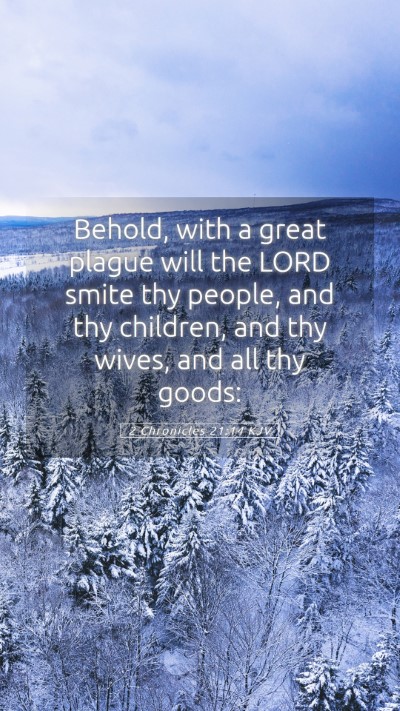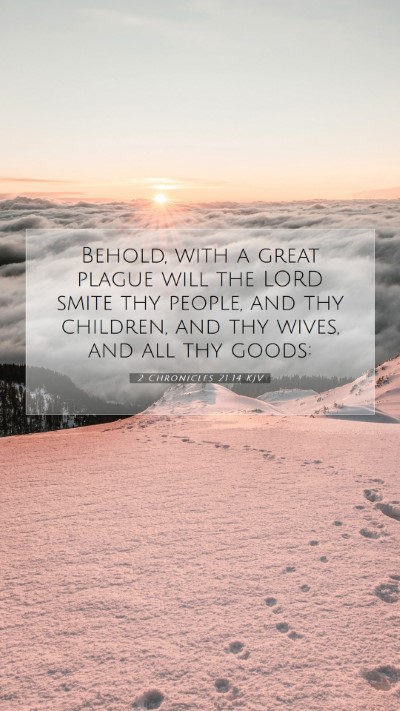Bible Verse Explanation: 2 Chronicles 21:14
The verse 2 Chronicles 21:14 states: "Behold, the Lord will bring upon you a great plague upon your people, and your children, and your wives, and all your goods." This verse serves as God's declaration of judgment following the sinful actions of King Jehoram, who abandoned the ways of the Lord.
Understanding the Context
To fully grasp the meaning of this verse, it is crucial to consider its historical context and the character of Jehoram's reign. Jehoram, who became king of Judah, led the nation away from faithfulness to God, engaging in practices that directly opposed the commandments as given to the people of Israel.
Commentary Insights
-
Matthew Henry's Commentary:
Matthew Henry emphasizes the severity of God's judgment against those who lead others into sin. Jehoram's idolatry not only invited God's wrath but also affected his entire household. The plague mentioned signifies a wider scope of suffering, impacting family and prosperity—a stark reminder of communal consequences in the spiritual domain.
-
Albert Barnes' Notes:
Barnes notes that one key aspect of this judgment is the divine retribution against the leadership's failure to uphold justice and righteousness. Jehoram's heart, corrupted by idolatry and unfaithfulness, resulted in a deaf ear to divine warnings, culminating in this prophetic doom. The mention of a 'great plague' indicates a divine miracle meant to instill fear and repentance.
-
Adam Clarke's Commentary:
Adam Clarke expands on the nature of the 'great plague' as not only a physical disease but may symbolize the broader spiritual decay and misfortunes that would befall Jehoram. Clarke delves into the implications of such a plague, stating that it serves both as a punishment and a call for returning to the covenantal ways of the Lord.
Theological Implications
The implications of 2 Chronicles 21:14 resonate deeply in biblical theology concerning God's justice, sovereignty, and the seriousness with which He regards covenant commitments. God's willingness to judge sin signifies his moral order and the necessity for leaders to adhere to His statutes. This verse cautions us on the dangers of idolatry and disobedience—not only for individuals but for the community and generations to come.
Application in Modern Life
For contemporary readers, this verse serves as a sobering reminder of the consequences of leading a life contrary to God’s teachings. The importance of personal and communal accountability in faith practices is emphasized. It challenges individuals to evaluate their spiritual walk and the potential impact of their leadership on broader society.
Cross References
- 2 Kings 8:24: An account of Jehoram's actions and their ramifications.
- 2 Chronicles 22:5: Further details on Jehoram’s moral failures.
- Isaiah 26:9: A reference to the importance of seeking God for guidance and life.
- Ezekiel 18:30: Calls for repentance, highlighting God’s desire for restoration.
- Galatians 6:7: The principle of reaping what one sows, aligning with the concept of divine judgment.
Conclusion
In conclusion, 2 Chronicles 21:14 stands as a critical warning within the narrative of the Scriptures regarding the consequences of rejecting God's authority. Reflecting on this verse helps us gain a deeper understanding of Scripture, encouraging us to pursue faithfulness and adherence to God’s commandments in our lives today.


